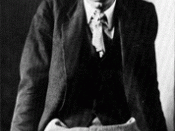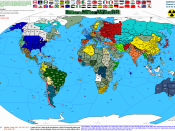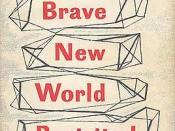Aldous Huxley's satirical novel "Brave New World", written in the aftermath of World War I, and Ridley Scott's science fiction film, "Blade Runner", made in the 1980s, both reflect a society having undergone major technological advancements, so much so that they are totally disconnected with the natural world. These texts do not significantly reflect the interaction of humanity with the natural environment to a great extent, but it is this lack that emphasises the issues present within the two texts, of mass production and consumerism, that man is enslaved by technology, and the consequences of abolishing nature.
Aldous Huxley wrote Brave New World in the 1920's when the power of the media was rapidly expanding, and mass production was on the rise. Motion pictures had become popular entertainment, and Henry Ford had initiated the industrial revolution with his first T-Model car. The novel expresses Huxley's fears about the possible future of such a society.
These are inherent in Brave New World, and are fleshed out in the way of life the population has adopted, particularly their consistent daily cycle, as 'the crowds' that 'daily left London to play Electro-magnetic golf or tennis' or go 'to the feelies'. Huxley emphasises the consumerist nature of the world state through the population's lack of morals, symbolised by the hypnopaedic phrase 'everyone belongs to everyone else'. This attitude not only scandalised Huxley's contemporaries, but greatly dehumanises every individual in BNW as the concern of mass consumption is limited not only to food - it includes human beings as well. Huxley creates caricatures in order to emphasise the brainwashing inherent in the World State, but indicates this is not the fault of the general population who are forced by conditioned instinct to act out their lives in a similar way every day.


